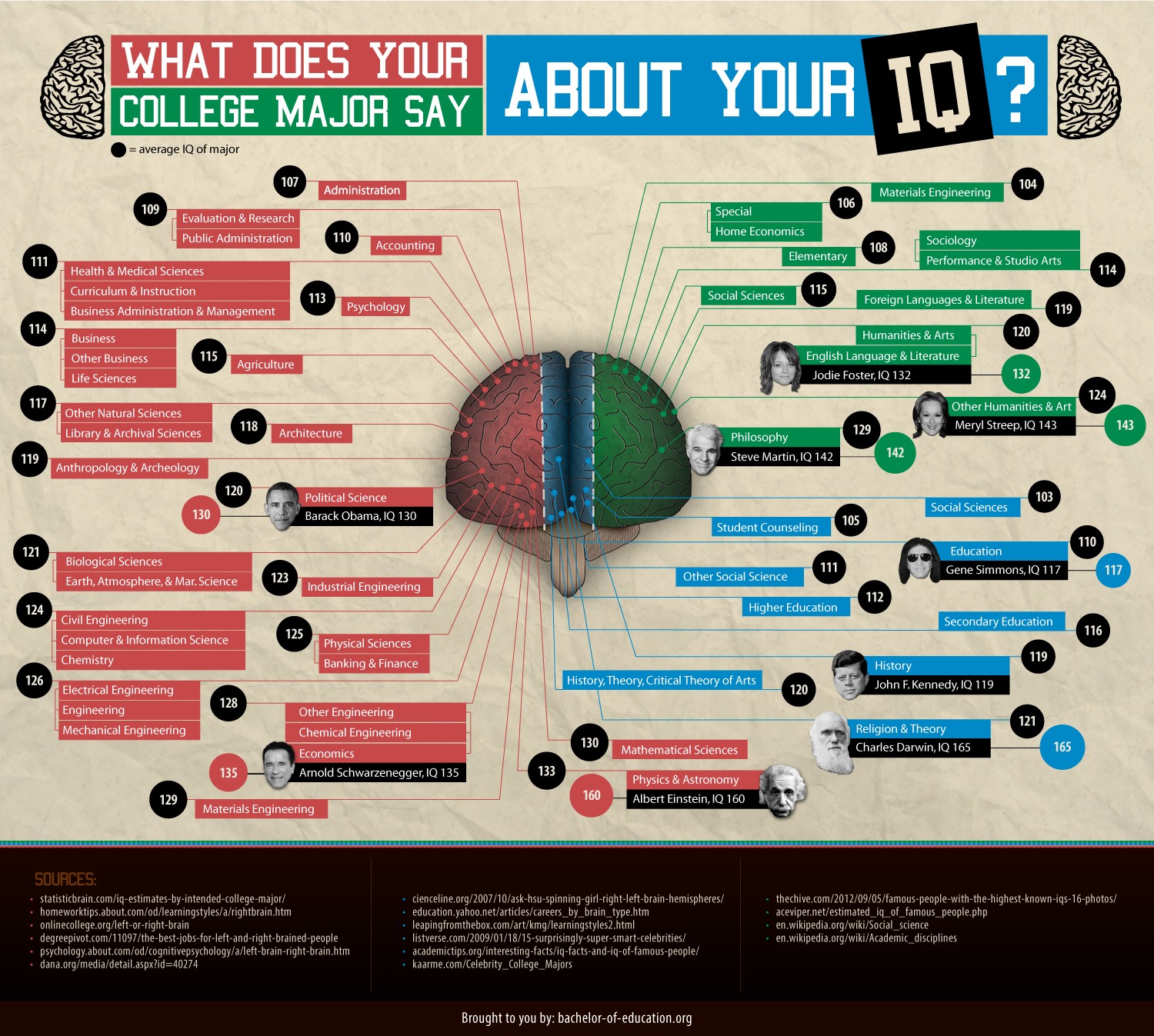Highest iq Majors- How Intelligent Are You?
- Views15283
- Comments 0
- College Tips
- AuthorRacheal M.

College Major And IQ-What Your College Major Says About Your IQ
Intelligence quotient or IQ is a score derived from one of the several standardized tests designed to assess intelligence. IQ measures raw intelligence, which means that it does not evaluate a person's ability to interact well with others, or one's knowledge or skills. This means that one can have an average IQ, but have years of experience in a particular skill or subject.
Everyone believes that you have to have some smarts to get accepted in to college, but just how smart is the average person in your major? You might be surprised that the average student IQ for a selected major in college. The highest IQ’s in college are parallel to the toughest majors in school. Do students who choose to major in various fields have different academic aptitudes? That question is important due to many reasons, the diversity of talent across various fields, an understanding of what fields top students choose to pursue and how this might reflect upon the majors and occupations and culture values.
What Studies to measure IQ by College Majors Say
Jonathan Wai carried out a research and used different measures of US students’ academic aptitude, which span from 1946 to 2014. He discovered that the rank order of cognitive skills of various majors and degree holders have remained remarkably constant for the last seven decades. The data presented looks at only at group averages and does not speak to the aptitude of specific individuals.
Clearly, there are people with high academic aptitude in every major and there can be a huge aptitude difference between entire schools. For instance, majors between the University of Chicago and a local community college than between majors within a school. In addition, interests, which are not directly, assessed here likely play an important role in which major someone selects. One could argue that any one specific test and sample may not be an accurate reflection of the aptitude of specific majors and this would be a valid point.
However, this analysis uses five independent measures and samples of academic aptitude at different point in time. These include everything from tests of cognitive abilities to tests of academic achievement showing these findings duplicate and are quite robust. In 1952, a study carried out by Dael Wolfle and Toby Oxtoby published in science studied the academic aptitudes of college seniors and recent graduates by discipline.
The first sample used to investigate this question was a standardized test score on the Army General Classification Test (AGCT) scale from a sample of 10,000 US college graduated from 40 Universities in 1946. They used AGCT as a selection test of general learning ability in the military and its modern equivalent is the Armed Services Vocational Aptitude Battery (ASVAB), which is still in use today.
Army General Classification Test (AGCT)
Median Score AGCT
| Education - | 122 | |
| Agriculture - | 124 | |
| Business & Commerce - | 124 | |
| Social Sciences - | 125 | |
| Biological Sciences - | 126 | |
| Humanities - | 127 | |
| Engineering - | 129 | |
| Physical Sciences - | 130 | |
The second samples were scores from 38,420 US college seniors who took the Selective Service College Qualification Test (SSCQT) put on the AGCT scale in 1951. This was a 150-item test measuring students’ mathematical and verbal ability, which does not appear to be in use today.
Selective Service College Qualification Test (SSCQT)
Mean Score SSCQT
| Education - | 118 | |
| Agriculture - | 122 | |
| Business & Commerce- | 126 | |
| Social Sciences - | 128 | |
| Biological Sciences - | 126 | |
| Humanities - | 128 | |
| Engineering - | 132 | |
| Physical Sciences - | 132 | |
The patterns in both samples are nearly identical. Students who choose to major in agriculture and education had the lowest average academic aptitude, whereas the opposite was seen in physical sciences and engineering.
Studies that display a correlation between college majors and intelligence cannot account for choice. Some of us choose several different majors during our college time. It may be that since STEM majors require rawer computational brainpower, STEM students are more likely to succeed on tests that measure for that aptitude.
According to studies carried out, the intelligence associated with a business major has increased in the last few decades. This shows that the major has steadily drawn more talent as national priorities have shifted in its favor. Before the financial crash, nearly 40 percent of business majors at certain Ivy League institutions became traders on Wall Street.
In conclusion, whatever majors we choose is also an indication of our national priorities. For example, In Korea and Finland they draw teachers from the top third of college achievers. However, it is different in the US; America is notorious for giving its educators short shrifts that result to the profession’s inability to draw top talent. What occupations and major’s future generations choose to pursue directly affects a nation’s future economy.
Check out this interesting infographic by bachelor-of-education . PLease Click On Image to Enlarge It:
 Image Courtesy of : bachelor-of-education.org
Image Courtesy of : bachelor-of-education.org
